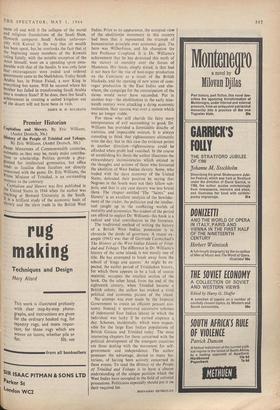Premier Historian
Capitalism and Slavery. By Eric Williams. (Andrd Deutsch, 30s.) PRIME MINISTERS of Commonwealth countries, estimable as they may be, rarely make contribu- tions to scholarship. Politics provide a play- ground for intellectual gymnastics, but office tends to fossilise those faculties not directly concerned with the game. Dr. Eric Williams, the Prime Minister of Trinidad, is an outstanding instance to the contrary. Capitalism and Slavery was first published in the United States in 1944 when the author was
teaching Is at Howard University in the South.
It a brilliant study of the economic basis of
slavery and the slave trade in the British West Indies. Prior to its appearance, the accepted view of the abolitionist movement in this country had been that it represented the triumph of humanitarian principle over economic gain. The hero was Wilberforce, and his champion the late Professor Coupland. It is Dr. Williams's achievement that he has destroyed this myth of the victory of morality over the forces of Mammon. His thesis, simply stated, is that had it not been for the rise of beet-sugar production on the Continent as a result of the British blockade, and the opening of new areas of cane- sugar production in the East Indies and else- where, the campaign for the emancipation of the slaves would never 'have succeeded. Put in another way—the abolitionists in the early nine- teenth century were attacking a dying economic institution, their success, was over a system which was no longer viable.
For those who still cherish the fairy story interpretation of evil succumbing to good, Dr. Williams has provided a formidable douche of statistics, and impeccable sources. It is always consoling to think that righteousness ultimately wins the day, but in this case the evidence points in another direction—righteousness could be afforded when profit had vanished. In the course of establishing his thesis the author illustrates the extraordinary inconsistencies which existed in the thoughts and actions of those who favoured the abolition of West Indian slavery. Some, who traded with the slave economy of the United States, defended their position by saying that Negroes in the South were not their fellow sub- jects, and that in any case slavery was less brutal there. The chapter entitled The "Saints" and Slavery' is an excellent analysis of the bewilder- ment of the trader, the politician and the intellec- tual caught up in the conflicting worlds of morality and economics. No student of the period can afford to neglect Dr. Williams—his book is a radical and vital contribution to the literature.
The traditional method of writing the history of a British West Indian possession is to chronicle the deeds of governors. A recent ex- ample (1961) was that of Gertrude Carmichael's The History of the West Indian Islands of Trini- dad and Tobago, The difference in Dr. Williams's history of the same islands is not merely one of title. He has attempted to break away from the school of 'kings and queens.' As might be ex- pected, the earlier period of Trinidadian history, for which there appears to be a lack of source material, occupies the smallest section of the book. On the other hand, from the end of the eighteenth century, when Trinidad became a British colony, the author has evoked a vivid political and economic picture of the island.
No attempt was ever made by the Imperial Government to create an efficient peasant eco- nomy. Instead, it sponsored successive schemes of indentured East Indian labour in which the individual was lucky if he earned sixpence a day. Schemes, incidentally, which were respon- sible for the large East Indian populations of British Guiana and Trinidad today. The most interesting chapters for those concerned with the political development of the emergent countries are those dealing with the movement for self- government and independence. The author possesses the advantage, denied to many his- torians, of having been actively concerned in these events. To read the History of the People of Trinidad and Tobago is to have a clearer understanding of the unique position which the West Indies have occupied in the field of colonial possessions. Politicians especially should put it on their required list.
FERNANDO HENRIQUES














































 Previous page
Previous page